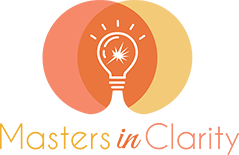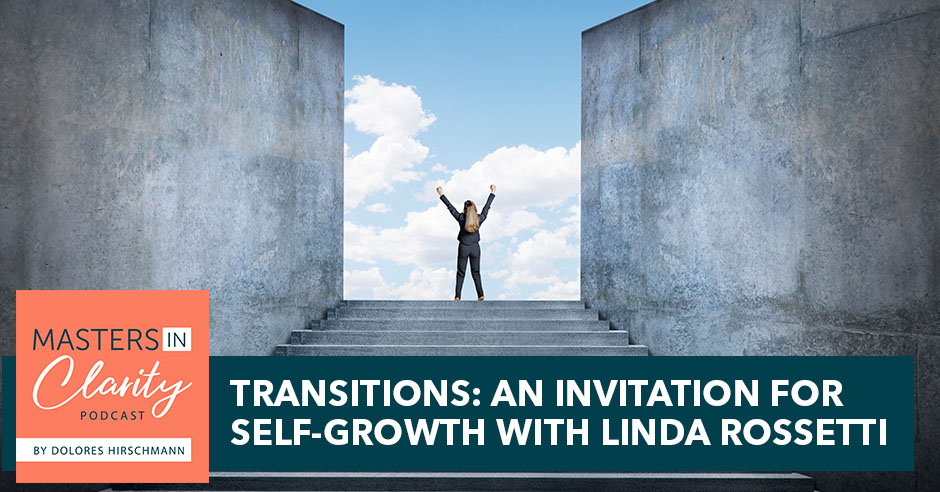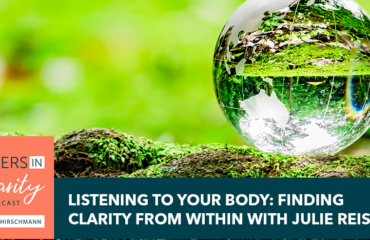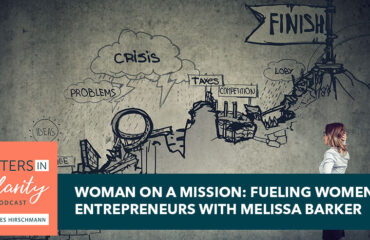Changes and transitions should not be interchanged because they are very different. Changes are used to reach a goal, while transitions are used when there’s a shift in what holds value and meaning to you. Transitions are invitations for growth. They allow you to come into your own voice. We need to learn how to embrace transitions to discover more about who we are.
Today, Dolores Hirschmann talks to author and transitions expert Linda Rossetti about recognizing your transitions. Linda helps people find their voice when they are in the middle of a transition. Transitions are normal, but they can be confusing. Discover how you can get through a difficult one while understanding yourself better along the way.
—
Watch the episode here
Listen to the podcast here
Transitions: An Invitation For Self-Growth With Linda Rossetti
I am so excited to bring you this next guest for our show. Linda Rossetti is an expert on individual and organizational transformation. A wrenching upheaval in her mid-40s sparked her curiosity about those times when we call into question who we are and how we make meaning in our lives. That experience inspired her to expand on a decades-long business career by pursuing research, writing and advocacy focused on how adults step into the fullness of who we are and our truth.
You don’t want to miss Linda’s interview because she talks about that moment when everything in your life seems perfect to the outside eye but internally, you are in a moment where you cannot find your footing. How do you navigate that? How do you move from a place of internal disruption without breaking everything in your outside world? Join us for this conversation with Linda.
—
Linda, it’s good to see you. Before the pandemic, we were on a panel together at the South Shore Conference For Women.
It was such a joy to be on the panel with you. I’m so happy to have the chance to talk again.
I remember my daughter was with me and we connected. I’m excited to start this conversation and bring to our readers this specific nuance that you have focused most of your career on that is so relevant. Let’s start at the beginning. How do we get here? How did you get to do the work you are doing? What has been your clarity journey? There’s a lot of confusion in clarity.
I’m fascinated by how we respond to major upheavals in our lives. That’s the thing that has grabbed my curiosity for more than a decade. The reason why I got there was twofold. One is in my mid-40s, I arrived at this moment where I felt as if the ground fell out from underneath me. I was in this free fall. From the outside, everyone said, “Look at that life.” I was an executive in a global Fortune 500 and the number 5 person in a 21,000-person organization. I had use of the corporate jet. My kids and I flew to DC for the weekend because it was good.
Yet I was struck by this feeling like something wasn’t right. It was radical. It wasn’t like, “I had a bad day.” I was in this increasing mode of not being able to function. I remember one day I borrowed a car. I say that in a very cautious way because we parked our cars underneath the building. We took 3 or 4 in a row because the place was teeny. You had to leave your keys in the car. Honest to God, I left the garage in the wrong car because I was in such a state. I was not functioning. When I say the ground fell from underneath me, I had this life but something was wrong and I had no name for it.
The second reason is everyone I tried to talk to about this was like, “Get over it. Go get some self-care. Move on. Buckle up.” Nobody wanted to honor the fact that I was in a space that was critical and scary. As much as I was feeling unmoored, I was also fascinated by the reaction of everyone around me. At the time, I ran HR and administration for this large Fortune 500 company. A colleague of mine ran an out-placement firm. I was like, “I want to talk to people who were in transition because I’m fascinated by this.” He’s like, “Let us be your learning lab, whatever you need.”
That started a series of conversations that I refer to as my research which has almost 300 people in it. I’ve spent hours talking to people who were in similar situations to my own. Their life circumstances were very different but all of a sudden, they found themselves in this moment of upheaval that they had no name for and yet they found it difficult to function to make their way.
There are a zillion reasons why we get to those moments but as a society, we are socialized to run the other way, to not give them oxygen or explore what they are but to tamp them down, ignore them, run the other way, buckle our shoes up and keep going. My work has all been about trying to understand what happens at those moments and give us a different way to respond.
Let’s bring this way down because the readers can relate. Transition is a big moment. What does it look like for you that day? You took the wrong car and felt what you were feeling. It wasn’t a day. It was a moment when everything stopped and you couldn’t do one more step. What happened next? Tell us the story. How did that translate into relating your tiny moments to your 300 reserved tiny moments of other people?
My first reaction to that is, “What’s wrong with me,” in a very serious way. I thought I had some mental functioning problem like there was something seriously wrong. That’s a very scary thing when you’re working 50 hours a week and you have 2 small kids. We are running lives. It was a time when I drew very close inward. I withdrew. I resigned from a lot of community work I did. I got to reduce stress in my life. What that ultimately did I can see in hindsight is that isolated me even more. It was the exact wrong thing to do because I pulled away. I ultimately left and resigned from the job thinking that the job was the problem.
I was like, “What’s wrong with me?” The first thing I do is start shedding things and commitments that I had. I was like, “I better get rid of this job.” That was a very terrifying thing. Economically, it had implications for my family. Socially, all the people I work with are like, “What are you doing?” When I was looking for what’s next, they’re like, “You’re not here anymore if you don’t exist.” I say that to say that it is terrifying to go into this zone that is a bit of a void. I was so curious about it. I knew that I couldn’t have been the first person to experience this.
I had spent 30 years by that time in the business world. I was like, “I know how to solve amorphous problems and figure this out.” I started to figure it out. I took one step and another step. I wish I could tell you it was some fancy moment and here’s the moment it all made sense but it didn’t. I took a step and kept taking another step.
Everything will make sense if you go one step at a time.
I’m curious about going this way in this conversation but let’s stay here. You took the actions you felt were the right actions. Some might have been exactly what they needed to be. Some might have been intuitively the right one but not what you needed like drawing away from people and organizations. I can relate to that.
We were chatting and I was sharing that it’s been hard. I’ll tell you this because it relates. I had been in such a state of physical pain, mental shutdown and burnout that I didn’t want to celebrate my birthday, which I love celebrating. It wasn’t until my aunt from Argentina said, “I don’t care what you do, I am coming,” and my best friend said, “I am coming.” Three women in my life who may be my best friend, my aunt and a cousin I hadn’t seen in twenty years came and set the table. They cut the fruit and hosted my neighbors who came.
I was celebrated that I realized that I didn’t want to celebrate and invite anybody. They didn’t listen. I am grateful they didn’t listen because that was what I needed for once. What you’re talking about and what I experienced and I’m trying to serve this conversation is that I didn’t want to be seen as broken. That’s why I shy away. It wasn’t because I didn’t need the help. I did but I didn’t want to have other people know that I needed help, nor did I want to experience it in a place of weakness.
That’s self-aware. First of all, happy birthday. That’s a lovely milestone. I’ve spent a decade talking with people who had moments as you described. I’ve learned that two different things occur in life that we don’t put a lot of brain time on. There are two words, change and transition. They mean different things even though we use them interchangeably. Changes are used to reach a goal. They are the known outcome, a variation and alteration. When I say, “I’m a marketing expert and I have my company but I’m going to go join Google,s” I’m making an alteration.
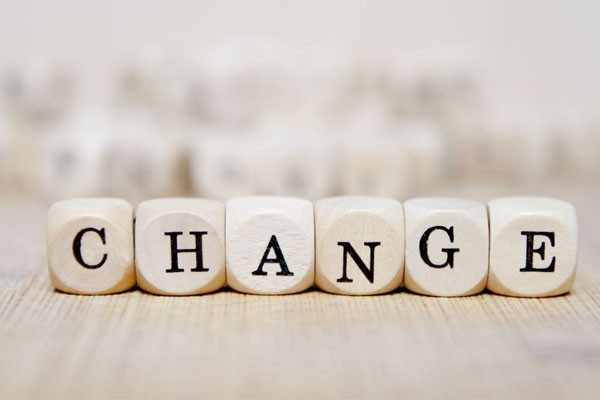
Transitions: Changes and transitions mean very different things. Changes are used to reach a goal. Transitions are used when there’s a shift in what holds value and meaning to you.
You get married, remarried and then divorced, which is a little different but all good. With change, we know the outcome. Transitions occur when there’s a shift in what holds value and meaning to us. Often, they occur when we’re not sure what’s happening but we have this sense. I drew in. It’s this notion that transitions are misunderstood. We think that they’re the same as change. They’re different. How we respond to them needs to be different. The beauty is that transitions are this invitation for growth. When I say growth, it is this opportunity to come into our voice in a larger way. When I use the word voice, it isn’t audible you hear me speaking. It’s our truth.
Transitions are invitations for growth.
What’s happening when we have these emotional reactions is we draw inward from the physical pain we were experiencing. “I drew inward because I couldn’t make sense of the environment I was in anymore.” Usually, what happens is our emotions mobilize to keep us safe. What happens is they staple our feet to the ground when in fact we need to keep going. We respond to emotion. Oftentimes, we can respond in almost a counterintuitive way.
This beautiful moment when your friends helped you on the ramp to celebrate your birthday is powerful. What they were doing is they were creating an environment for you to be and get closer to who you are. The thing that has been most inspirational about the work that I’ve done is that people have all these ideas that transition is leaving something like, “I leave a job, the geography or the marriage. I go into a new relationship.” That’s the transition. While society teaches us that that’s true, what I’ve learned is transition is this process of coming into our voice.
We’ll never do it with change alone. We have to constantly evaluate who we are and how we make meaning in the world. It’s through that process that our voices strengthen. That’s what transition is. I submit to you that sometimes we get there through pain but after my research, I’ve read that pain is real but it also can be a signal to say there’s something more. It’s a beautiful time to reach for that.
There’s so much to unpack in this. I want to put this in the context of what you stand for. One of the things that you’ve talked about is this place of advocacy in the study, support and resources of helping adults to step into the fullness of who they are, their truth. I want to bring that forth because why are we talking about all this? Why are you studying transition versus change and doing the work you’re doing? You have a second book coming up. You have a very successful first book. This is all the ingredients and the recipe for creating the space, guidance or resources for us adults becoming into our full expression of ourselves, our truth.
You talk about change and transition. The way I’m interpreting your way of explaining this is change is mostly engaging your head. It’s like, “I need to do this. I’m going to go right there.” You gave a specific characteristic, which is change means you are clear you’re going from point A to point B. Almost change could be a drive. Maybe you don’t know how exactly you’re going to feel but you know exactly where you’re going to end. Transition and why it’s scary is the opposite. Something is changing. You could use that word change but it involves the head and the heart. The head has no footing from which to lead because there’s so much turmoil and stirring in the soul or heart.
We decouple from so much that’s familiar when we transition. That’s unknown. Our bodies react to that instability in lots of ways. Many people in my research have had pain in lots of parts of their body, be it back pain, headaches or what have you. We respond to it energetically. Some people get amped up. Some people get lethargic. We respond to it emotionally.
This notion is when we lean towards transition. While it’s this enormous invitation, we respond with our hearts, motives and energy systems in ways that can be confusing. It can throw us off the track of advancing to where we have the possibility to go. The reason why I do this work is there’s something about it that captures my heart. It is this need for context. That’s all it is.

Transitions: When people lean towards transition, they respond with their hearts in ways that can be confusing. It can throw them off the track of advancing to where they can go.
I feel like I’m an educator more than anything else. If I can give you an understanding of what change and transition is, the next time you are smacked by something unexpected, you have the context to experience that upheaval in a new way. If that happens, I declare victory. We have this enormous capacity as individuals. Often, whether it’s because of our gender, intelligence, ethnicity, geography or whatever it is, we get these messages like, “No, don’t reach for that. You need to be lesser.”
That makes me crazy because everyone has this enormous capacity. There’s so much capacity left untapped. I do this work because I’m like, “If I give people the tools to understand what’s happening at a moment of upheaval, they’re going to reach forward.” That’s what we all need to do. We need to constantly be in moments of uncertainty. Instead of pulling back, we need to go forward. We can because there’s so much that we have. Every person reading has so much that’s untapped. It isn’t just for the few, the proud or the genius entrepreneur who’s a billionaire. It’s for everyone.
I went to school as a young kid at the Sisters of St. Joseph. They were an order of nuns that taught school in the US in the ‘60s and ‘70s. They always said, “A life well lived is a life in service to others.” That baked into my brain at some point. My work is that. It’s in service to this notion of believing in yourself. Go find that voice. Find your voice. It doesn’t come with one swing of the bat like, “I’m here.” It’s risking a little bit today, a little bit more tomorrow and much more than the next day.
Risk a little bit today, a little bit more tomorrow, and that much more the next day.
For me, it’s been at every decade. Every decade I go through a transition. I’m recognizing it. It’s interesting. I’ll keep bringing up my experience because it helps illustrate. As you’re talking, I’m recognizing that I am in transition with that pain. For those reading who are like, “How do you realize that you are in transition,” it is because something falls way off. For you, Linda, there was a feeling that something was wrong mentally.
Maybe some scientists will say that was burnout. You can put labels on it. It doesn’t matter. For me, I took my back pain and was like, “I hurt my back.” I then started going in. I bought a book saying, “Heal your back. Look at your psychology around it.” I got into therapy to talk about what back pain means. I have three herniated discs that show in the MRI. I’m not discussing that but what about me bringing this in now? The timing matters and the timing gives you information.
That example you raise is interesting. What I often say to people is there are ways to start that are easy to bring our awareness to what’s happening. One of the first ways is to think about the expectations that we carry. Most of us enter adulthood. We use what is external to us to form our definition and expectation for who we are. We use the communities that we live in, the schools we attend, our families and our religious affiliation. There are a zillion things that we look to as reference points and that’s how we form who we are. That’s the identity we create. We nourish it from those external pieces.
When we go through transition, we are moving to a new place where we rely on different inputs to define our expectations and definitions for who we are. We don’t throw the baby out with the bath water but we turn up the volume on those things that hold value and meaning to us. What that often means is that we have to occupy our identity differently.

Transitions: When you transition, you’re moving to a new place where you rely on different inputs to define your expectation and who you are.
We might still have faith or a connection to a community that’s the same but we might not lead with that. We’re different in how we occupy because we are more rooted in our genuine voice, what is of value and meaning to us. The easiest way to begin to recognize if that shift is happening is to ask ourselves what expectations we carry for ourselves. I talk to all these young women and they’re like, “I’m going to be a GM by the time I’m 40.” I’m like, “That’s excellent. That sounds like a good goal. Where does that come from? Why that?”
As simple as that, ask yourself, “An expectation is I want to be a good parent or neighbor.” It doesn’t matter what it is. Bringing our awareness to what it is we carry like what we are setting our expectations on is an excellent exercise because, in that, we can go down the list once we create it and say, “That one is in flux. I got that from my first boss whom I stopped working with years ago.” That can help dignify what is expressing itself in our life. That’s a simple exercise to say, “Look at that. If that isn’t something that I either believe in or think it’s current, what am I leaving space for?” It’s a lovely, simple way to begin.
I’m going to break it down. Stop me if I’m off track but it’s important, especially for young people, transitioning from high school to college and from college to the world, that senior year. I have three children, one is done with college, one is going through it and another one did it through high school. Everybody experiences it differently but there are a couple of elements here. The first step is giving space to whatever you are feeling. All of us push through until we have a mental cry, it doesn’t have to be a breakdown, back pain or hives. It will show up somehow in your physical being.
First is if you’re off, give it space. The second is, “What is in my backpack?” I love that you said we are carrying expectations. Put it down on paper, “What is it that I’m carrying?” I was talking to my daughter and she was saying, “I need to be X by the time I’m 23.” I’m like, “Where did that come from? I’m happy for you but is that something you’re carrying or is that something you’re embracing?” There is a difference.
I’ve talked to people who are 20, 70 and every age in between in my work. I find some of the heaviest burdens are those in their late 20s who went to college, got out and tried something and realized at the end of their 20s that they don’t like it. They almost cannot discharge that experience from a sense of failure like, “I’ve failed.” In fact, it’s nothing of the sort. What it is, is moving to this place of self-definition earlier than maybe the rest of the population. Some people go through life and make thousands of changes and never transition.
If you make a decision you don’t like, you’re not a failure. You’re just moving to a place of self-definition earlier than most people.
How can you go through change and not transition? My interpretation of what you’re saying is that you never give the space and have the courage to unpack your backpack and remove other people’s identities. You have incorporated expectations and shoulds that you don’t give yourself the time and the permission of saying, “I choose to move forward with this expectation. I choose to let go and send that back to my boss of twenty years. Thank you but no thank you. Thank you but it’s no longer serving me. Thank you but I no longer choose it.” That discernment is where you make a change a transition.
To be fair, we get mixed signals from society. A lot of people don’t know the difference. They think they’re doing the right thing. The right thing is to buckle down and get going. I thank you for having me join you here to help me educate. Once we know the difference, we can bring a different energy to our experience of upheaval, whether it’s a crummy boss or an apartment that doesn’t make any sense. If we have the tools in those moments to make different choices, we can change the trajectory of our lives.
With the right tools, which I understand you didn’t have at your moment of transition, we could make that transition for the highest good of all of us. Back to my experience, I know that I’m in transition so my thinking is not how I get out of all the commitments I have. That’s not where I’m going. I’m going with, “Let me get clear of where am I going. Where do I want to go?” Let that inform how I transition beyond whatever commitments I have or not. Clarity, awareness and leaning into the experience of transition can bring forth an amazing, beautiful process and avoid so much pain that the 300 or more people you’ve talked to have in many ways. Without aroma and resources, the transition will bring a lot of pain. It doesn’t necessarily have to.
These moments of upheaval in our lives are incredible invitations. There’s irreplaceable goodness in everyone. You don’t have to leave your current experience to participate. A lot of people are like, “I can’t. I got to pay the mortgage off. I got to send the kids to college.” You can make those shifts right where you sit. It’s a lot inside. It’s a different way you greet now. It isn’t a departure. It’s a wonderful place to begin, which is to center on who we are and how we make meaning in our world. Give space for that. Don’t think that that’s wrong, offbeat or a different course. It’s honoring that and continuing to foster it.
Thank you for your time. I want to honor that. Where can we find out more about you?
You can go to LindaRossetti.com. Right there, you can find links to my podcast. I write a blog. I’ve had a ton of speaking engagements. There are video vignettes there. There are a lot of resources. I also offer a free weekly drop-in session for those who are in transition. You can find that. It’s called Dishing on Disruption. The information on that is right on my website in the speaking area.
Linda, I always want to leave our readers with a clear action they can take. What is a clear action you would invite our readers to take on?
I would ask each of you to take one step that brings out your voice in a new way, whether that’s in a conversation with a sibling, a family member, at a workplace or with the dog. It doesn’t matter. One step to turn up the volume on your voice.
Thank you so much for joining us. As always, it was a pleasure. You’ve read it. Wake up, look at where you are and understand exactly what is the next step to bring your voice forward.
Dolores, thank you for having me. I appreciate it.
You’re very welcome, Linda.
—
Have you ever thought about the difference between change and transition? You don’t want to miss this conversation I just had with Linda, where we go deep into how we recognize transition. She talks about how most of us go through life doing the changes that life brings us forth but we never embrace those changes enough or go deep enough to recognize them as an identity transition and a moment of understanding who we are, what are we here to do and what do we hold of value in our lives. That difference can be the biggest meaning and fulfillment for your life. You don’t want to miss my interview with Linda.
Important Links
- Linda Rossetti
- @LindaRossettiAuthor – Instagram
About Linda Rossetti
 Linda is an expert on individual and organizational transformation.
Linda is an expert on individual and organizational transformation.
A wrenching upheaval in her mid-forties sparked her curiosity about those times when we call into question ‘who we are’ and ‘how we make meaning in our lives.’ That experience inspired her to expand on a decades-long business career by pursuing research, writing, and advocacy focused on how adults step into the fullness of who we are – our truth. Through her own unexpected transition and extensive research born out of curiosity, she developed a profoundly new approach to progressing through major milestones in a way that allows people to successfully see and navigate a path forward in a highly effective and rewarding way.
Her work has been featured on NPR, NECN, CBS/WBZ, Money Magazine, Next Avenue, and other outlets. Her podcast, Destination Unknown, has explored transition with 2015 Nobel Peace Prize recipient Ouided Bouchamaoui, NPR Marketplace host Tess Vigeland, Miss Singapore, Rachel Leung, and others. Her 1st book, Women & Transition: reinventing work and life, is an Amazon top seller. Her second book on disruption in adult lives is scheduled to be released in May 2023.
Linda’s work extends her deep experience in organizational transformation. She served as CEO of EMaven, Inc., the venture capital backed tech company that led enterprise digital transformation on behalf of its clients. She also served as EVP of HR and Administration for Iron Mountain, a global Fortune 500 company, where she worked to integrate more than 200 acquisitions while transforming the organization into a digital records leader.
Linda is deeply active in her community and has served on not-for-profit and for-profit boards for more than twenty-five years. She is the parent of two teenagers and a loveable golden doodle named Apollo.

